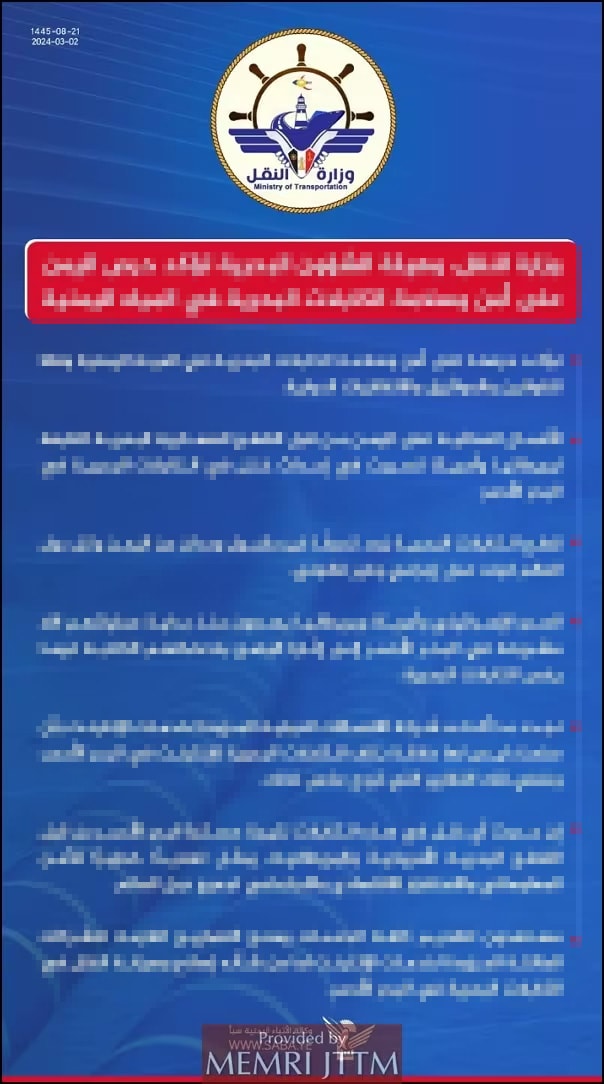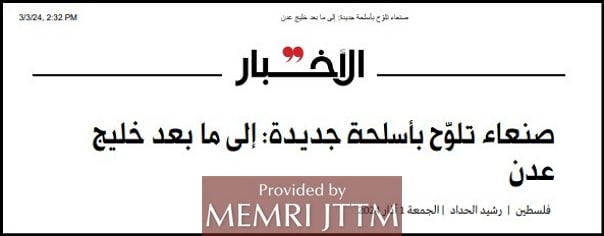The following report is now a complimentary offering from MEMRI's Jihad and Terrorism Threat Monitor (JTTM). For JTTM subscription information, click here.
On March 2, 2024, in a joint statement, both the Houthi Ministry of Transportation and the Houthi Maritime Affairs Authority accused the U.S. and Britian of damaging undersea cables in the Red Sea as part of the war they say the two countries are waging against Yemen. At the same time, the pro-Hizbullah, Lebanese Al-Akhbar daily claimed that according to "military sources" in Yemen, the Houthis possess "strategic weapons" that they have not yet employed, and that in the near future they intend to expand their military operations to beyond the Gulf of Aden and attack Israeli ships in the Mediterranean Sea as well.
The following is a review of Houthi statements and reports from Al-Akhbar between March 1 and 2, 2024:
On March 2, the Houthi Ministry of Transportation and the HouthiMaritime Affairs Authority issued a joint official statement in which they accused the U.S. and Britain of employing "hostile and illegal methods in their war on Yemen" which, they contend, caused "disruption in the undersea cables in the Red Sea, which jeopardized the security and safety of international communications and the normal flow of information." In their statement, the Ministry and the Authority asserted that, "these hostile acts pose a major challenge to the stability of the telecommunications infrastructure," and added that the damage to the undersea cables was "unacceptable… and a criminal and illegal act." They also affirmed their readiness to "provide all services and grant the necessary permits to companies that own internet services to repair and maintain defects in submarine cables in the Red Sea."

It is notable that international media reports which emerged on February 24, 2024, said that several undersea cables that pass through the Bab Al-Mandab Strait at the southern tip of the Red Sea were damaged. Several days later, on February 27, the Houthi-controlled Yemeni Ministry of Telecommunications and Information Technology released a press release denying any connection to the reported damage to undersea cables, and claimed that such reports were propagated by "media outlets linked to the Zionist enemy."
Also on February 27, the Lebanese Al-Akhbar daily reported that, "more than one military source in Sana'a" had divulged that "the anticipated dramatic military turnaround would depend on the scope of the battle." The same sources stated that Yemen had not yet employed "the strategic weapon" that it possesses. They further hinted that Israeli ships would also be unsafe in the Mediterranean Sea, because the Houthis have advanced weapons with a range of more than 2,000 kilometers (more than 1,200 miles). These sources also said that, "The next military phase will be a phase of surprise operations which surpass all the military assessments of the U.S., Britain, and Israel." In response to a question about whether the Houthis intend to attack inside Israel, the sources replied, "Some [of the attacks] will be beyond the borders of Yemen, but in accordance with a new bank of targets and [they will be] astonishing operations which to a great extent will change the course of the battle."

Furthermore, a March 1, 2024 report in Al-Akhbar that was attributed to "knowledgeable military sources in Sana'a," maintained that the Houthis plan to introduce new weapons into the marine battle, and to expand the sphere of conflict to beyond the Gulf of Aden. The same sources believe that as soon as in the coming days (during the first week of March 2024), Houthi forces will begin to carry out "high-quality operations" against American and British naval vessels in the Red Sea and the Arabian Sea.

In the same context, it is noteworthy that in his most recent speech, delivered on February 29, 2024, Houthi leader 'Abd Al-Malik Badr Al-Din Al-Houthi stated that the Houthis "have surprises that the enemies are not expecting… These are effective operations that will be carried out, if Allah so wishes."

The full text of this post is available to subscribers.
Please login or register to request subscription information from MEMRI




